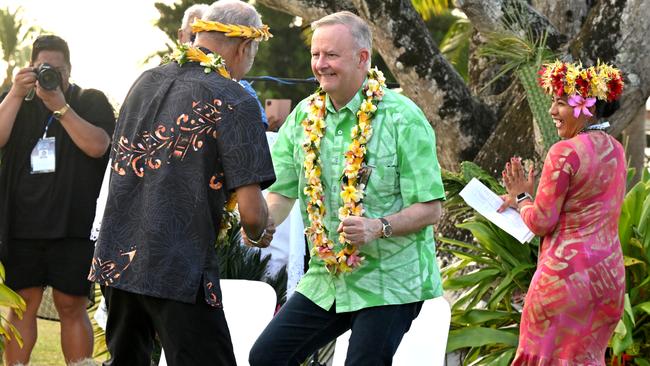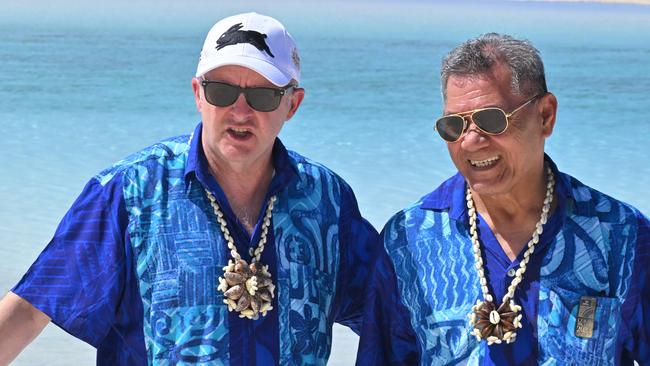
Anthony Albanese told us that Australia’s security agreement with Tuvalu was the most historically important we’d ever done with a South Pacific nation. It notionally gave Canberra a veto over Tuvalu having a security agreement with anyone else.
Then Tuvalu had an election, the prime minister lost his seat in parliament, and it turns out that the people who might form the new government want to rethink the agreement altogether and scrap it or renegotiate it.
Much more importantly, Papua New Guinea’s Foreign Minister, Justin Tkatchenko, revealed that Port Moresby is in talks with China on a new security deal with would include policing.
This is despite the Australia-PNG agreement, which was meant to forestall PNG seeking security agreements with other nations, especially those outside the region.
The Australia-PNG security agreement was watered down from a security treaty, partly because it would have faced stiff opposition in the parliament if it needed ratification. It’s now a much lesser agreement. Similarly, Australia’s security agreement with Vanuatu is not yet ratified and is now being reconsidered by the government in Port Vila.
Nauru recently switched its diplomatic recognition from Taiwan to mainland China, with substantial aid and loans expected to follow. Nauru’s diplomatic recognition of Beijing or Taipei in principle doesn’t matter directly to Australia. But the switch indicates a large and growing role for Beijing in Nauru’s national life.

It is a key aim of Australian policy to restrict China’s security role in the South Pacific, avoid the nightmare scenario of Beijing one day securing a naval base there, prevent it dominating telcos or cyber companies, while welcoming Chinese development aid provided it follows the rules of good government and transparency.
Australia still does not know the full text of the security agreement between Beijing and the Solomon Islands. The Solomon Islands will hold national elections in April. Well-informed observers think Chinese money could play a significant role in those elections.
East Timor late last year upgraded diplomatic relations with Beijing. A joint statement between China’s President Xi Jinping and East Timor’s Xanana Gusmao talked of enhancing military co-operation Australia has stumped up another $30m to help with Timorese policing.
In Fiji, the Albanese government ran into some blind good luck when an anti-China Sitiveni Rabuka just pipped the more pro-China Frank Bainimarama in an election, and reversed much of Fiji’s growing intimacy with Beijing. One other thing. The Albanese government claimed that if the referendum on the voice to parliament was lost this would damage us greatly in the South Pacific, and to some extent in Southeast Asia.
Nothing remotely of this sort has occurred. Both regions have shown a sensible and complete indifference to Australia’s internal identity politics obsessions.
The Albanese government is still making a fair fist of the South Pacific, but its grand narrative is exposed as complete nonsense.
The opposition’s Simon Birmingham comments: “The simplicity and naivety behind the Albanese government’s proposition that all you have to do is pay more attention to these countries has been exploded.
“The truth is it’s a tough, competitive environment that will be continually contested.”
The Albanese government claimed the Morrison government had neglected the South Pacific. Riding on the back of new climate change commitments, it could repair this neglect and establish a series of agreements and treaties which would safeguard Australia’s interests.
This narrative was wrong in all respects. Except for then foreign minister Marise Payne’s bizarre disinclination to travel frequently in the region, the Morrison government hadn’t neglected the region at all. And all the Albanese government’s agreements so far have failed to land. Nothing is going to stop South Pacific leaders, who desperately need resources, auctioning off access to their nations again and again. Meanwhile, the Albanese government minister responsible for the Pacific is not only a junior minister, but has another giant portfolio, Defence Industry, meaning he can do neither job properly.
Overall, the government has still done well enough in the Pacific, but the story it tells is mostly moonshine.




The Albanese government’s grand narrative of Australia’s place in the South Pacific is falling apart. It’s not that the government has done anything disastrous in the region, but much of what it’s told Australia turns out not to be true.